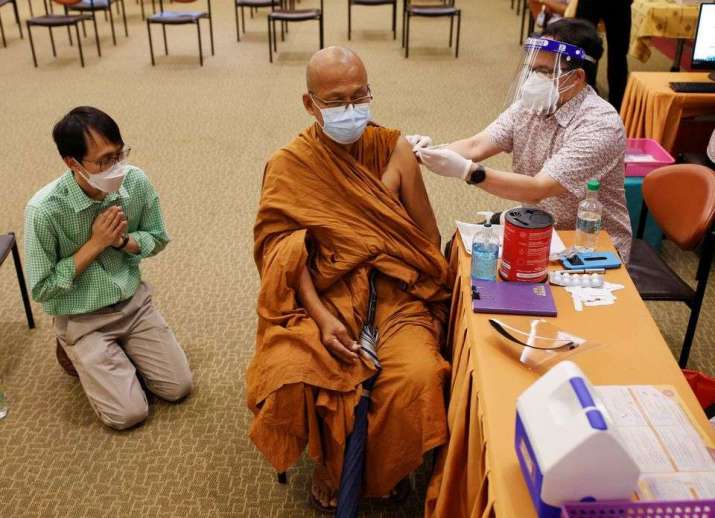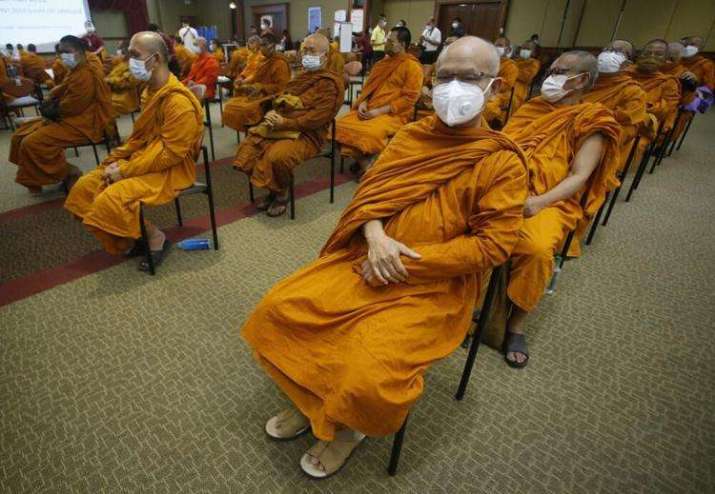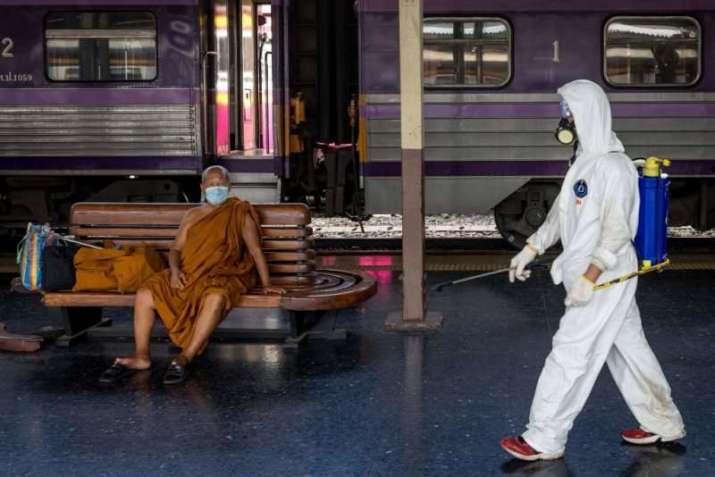NEWS
Thailand’s Buddhist Monks Receive COVID-19 Vaccinations
 From reuters.com
From reuters.comBuddhist monks in Thailand began receiving vaccinations for the novel coronavirus this week, having been given priority ahead of much of the general population. In Bangkok on 17–18 May, some 500 monks received their first dose of China-developed Sinovac vaccine.
With the vaccine it is hoped that monks can safely return to their spiritual duties, including daily alms rounds and engaging in merit-making activities with Thailand’s predominantly Buddhist population. Since the monks can interact with many different people over the course of a few days, they could also serve as spreaders of COVID-19 if they become infected.
Montchai Chumnumnavin of Bangkok's Priest Hospital, a medical facility exclusively for monks, where the vaccines were administered said: “These activities are putting them at risk where they can come into contact with an infected person. The faster we can provide them with vaccines, [the faster] they will build up immunity to protect them from contracting the disease from devotees.” (Reuters)
While vaccinations began in Thailand in late February using the Sinovac vaccine, only around 1.5 million people in the kingdom, which has a population of 66 million, have received at least one dose. The government has since said that plans are underway for a mass-immunization campaign beginning in June. That campaign will rely on 35 million imported doses of the Oxford-AstraZeneca vaccine, along with 26 million more doses being produced in Thailand by the pharmaceutical company Siam Bioscience.
 From wdrb.com
From wdrb.comOne problem Thailand faces is vaccine-hesitancy, but by vaccinating monks, the Thai government may gain greater support for the vaccines from the general public.
“People don't trust the government and they don't trust the vaccines the government has secured for them,” said Thanathorn Juangroongruangkit, an opposition politician and former prime ministerial candidate. “Trust is earned. You cannot build it overnight. So when the government says people should go and get themselves vaccinated, people tend to be hesitant because they are not sure of the side effects and the efficacy of the vaccine.” (DW)
Thailand is battling its third and largest wave of new infections, with the number of new daily cases rising sharply into the low thousands in mid-April. Total cases in the country are now at 119,585, with 703 deaths, according to World Health Organization data. Many of the new cases are attributed to the B117 variant first identified in Britain. The variant first discovered in India, B.1.617.2, has also been identified by health authorities in Thailand this month.
In January 2020, Thailand was the first country outside of China to confirm a case of the novel coronavirus. However, the country took swift action to secure its borders and introduced health measures that were successful at preventing a massive outbreak of the disease. The country is not alone in seeing a sudden rise in cases after a long period of success. Much of Southeast Asia is experiencing a wave of new cases, with concern that the situation could come to resemble the devastation being experienced across India.
 From time.com
From time.com“What we are seeing in Southeast Asia are the initial symptoms—that cases are increasing in a similar manner to what we were seeing four weeks ago in South Asia,” said Abhishek Rimal, Asia-Pacific emergency health coordinator at the International Federation of Red Cross and Red Crescent Societies (IFRC). “The second wave is really creeping across Asia, spreading from South Asia to Southeast Asia.” (Time)
Neighboring countries such as Vietnam and Cambodia are stepping up measures to contain local cases, while Myanmar’s health system is in disarray due to that country’s military coup and ensuing violence, which began on 1 February.
“The Greater Mekong countries are geographically very close to each other, with miles of common borders,” said Jeremy Lim, associate professor in public health at the National University of Singapore. “The movements across borders are substantial and hence the heightened risk of transnational transmission which can be mitigated but not eliminated.” (Time)
See more
Thailand starts COVID-19 vaccinations for monks at risk (Reuters)
Buddhist monks wait for vaccine in Thailand (WDRB)
COVID: Thailand's slow vaccine rollout sparks anger (DW)
Southeast Asia Kept COVID-19 Under Control For Most of the Pandemic. Now It's Battling Worrying New Surges (Time)
Related news reports from Buddhistdoor Global
Buddhists in Thailand Shorten Funerals amid COVID-19 Third Wave
Thailand Marks Second New Year with Muted Celebrations as COVID-19 Precautions Continue
Buddhist Monks in Cambodia and Thailand Limit Religious Services Amid Pandemic
Buddhist Monks in Thailand Use YouTube to Make DIY Masks and Safety Equipment
Buddhist Temples Become Soup Kitchens Across Thailand
Vesak Goes Digital as Buddhists Head Online to Honor the Buddha
Face Masks and Pali: Life for Buddhist Novices in Thailand Goes On amid Social Distancing
International Network of Engaged Buddhists Launches COVID-19 Emergency Relief Fund














